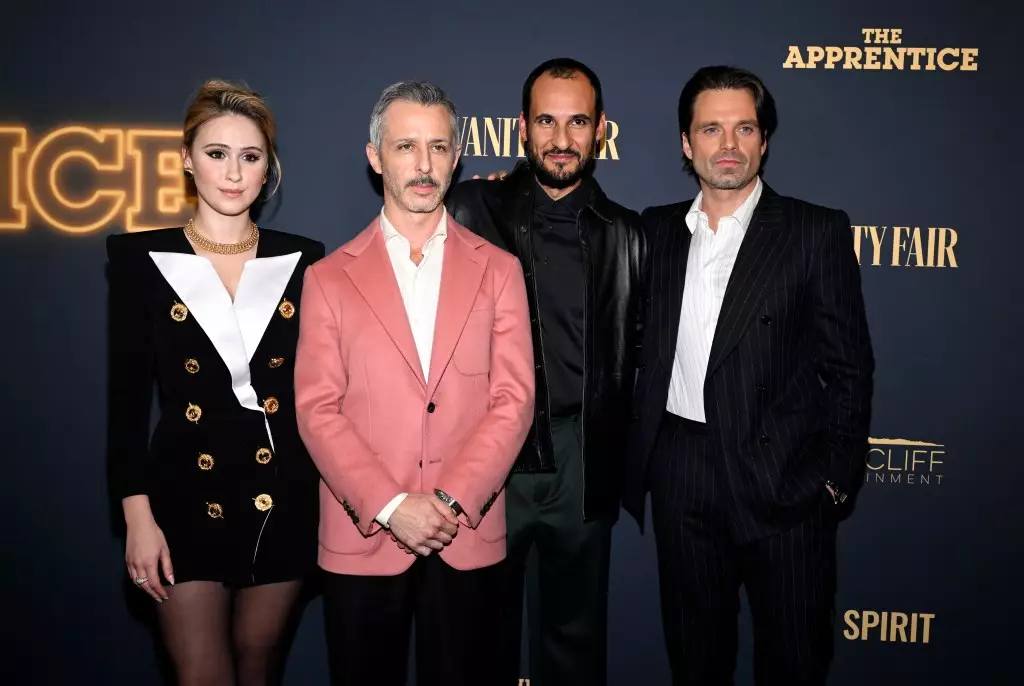The recent New York premiere of the film “The Apprentice,” directed by Ali Abassi and produced by James Shani’s Rich Spirit company, presented a vivid illustration of the multifaceted nature of independent filmmaking. Shani, brimming with enthusiasm, addressed attendees, reflecting on the arduous journey that led to this momentous occasion. The film, which chronicles Donald Trump’s ascent from businessman to mogul with the help of Roy Cohn, had encountered significant hurdles along the way. The exit of Kinematics, a producer that had ties to Trump sympathizers, left the film in a precarious situation, highlighting the inherent challenges faced by creators embarking on projects that delve into contentious historical figures.
Shani’s acknowledgment of the struggles that plagued the production underscored the fearlessness required in the current media landscape. With threats of legal action hanging in the air from Trump’s attorneys, the film’s fate appeared uncertain, illustrating the potential ramifications for filmmakers daring to uncover uncomfortable truths. Despite these obstacles, filmmaker Tom Ortenberg’s decision to step in as distributor catalyzed the film’s journey to theaters, bringing Shani’s vision to fruition amidst a climate where many shied away from association with the controversial subject matter.
The words of Gabriel Sherman, a journalist and screenwriter for “The Apprentice,” resonated profoundly within the context of the film’s chaotic history. Sherman shared his own experience while preparing to attend the Telluride Film Festival, expressing the anxiety and uncertainty surrounding whether the film would even screen. His remarks highlighted the unpredictable nature of the film industry, particularly for projects entangled in intricate legal disputes and fears of backlash. The sentiment of resignation—“I’ve had to not have any expectations with this movie just to stay sane”—served as a reminder of the emotional toll that accompanies the artistic process.
The chaotic trajectory of “The Apprentice” mirrors the broader landscape of contemporary filmmaking, where external pressures and controversies can easily overshadow the creative process. Indeed, Sherman’s acknowledgment of the unprecedented nature of the hurdles faced by the production serves as an indictment of the current state of the industry, particularly for narratives tackling polarizing topics.
Amidst the fervor of the premiere, Abassi offered a nuanced perspective on the American political landscape that transcends traditional party lines. His assertion that he avoids viewing political figures solely through a binary lens provides an interesting framework for understanding the complexities of Donald Trump as a character in “The Apprentice.” The portrayal—captured by actor Sebastian Stan—depicts a multifaceted Trump, blending insecurity with ambition, charm with cruelty. This contrast raises compelling questions about the nature of villainy and the humanizing aspects of flawed individuals in positions of power.
Abassi’s reflections on the film’s controversial scenes, particularly one depicting an act of sexual violence, challenge audiences to confront uncomfortable realities, suggesting that the narrative seeks to reflect documented truths rather than sensationalize or distort them. As he asserted, “If we hold up a mirror…you can break the mirror, I guess, if you want, but that image is not going to go away.” This bold claim shifts the onus onto the audience, prompting them to engage with the moral complexities intrinsic to the characters presented on screen.
The challenges faced by “The Apprentice” resonate with broader discussions concerning the responsibility of filmmakers in addressing sensitive topics. As the film struggles to find its footing in a world fraught with divisive opinions, it exemplifies the risk inherent in art that provokes critical discourse and grapples with controversial figures. The filmmakers’ willingness to challenge societal taboos illustrates a commitment to authenticity and truth-telling that, while contentious, holds the potential to foster necessary dialogues about power dynamics and accountability.
As audiences prepare for a wider release, the journey of “The Apprentice” serves as a potent reminder of the courage necessary to navigate the murky waters of contemporary storytelling. It encapsulates the struggles, triumphs, and inevitable controversies that accompany significant artistic endeavors. Whether hailed as a revelation or derided as politically charged, the film invites viewers to reflect critically on the intricate relationship between art and the societal currents that shape our understanding of historical narratives.

